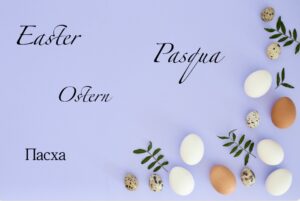As the Easter season unfolds, it beckons us to delve beyond the surface of its festivities and traditions, inviting curiosity about the origins of its very name. Amidst the vibrant array of colors, flavors, and customs that adorn this time of renewal, lies a linguistic enigma waiting to be unveiled.
The term Easter carries with it echoes of ancient mythology and religious symbolism, weaving a fascinating tapestry of cultural heritage and linguistic evolution. In this exploration, we embark on a journey through time and language, tracing the origins of Easter to uncover the hidden narratives that have shaped this celebrated holiday.
Rooted in ancient traditions and religious symbolism, the term Easter resonates across cultures and languages, each imbued with its unique nuances and interpretations. Exploring the etymology of Easter unveils a captivating journey through time, weaving together threads of pagan mythology, Christian theology, and linguistic evolution.
The English word Easter finds its origins in the Old English word Ēastre or Ēostre, which refers to a Germanic goddess of spring and fertility. This goddess, Ēostre or Ostara, was celebrated during the spring equinox, symbolizing the renewal of life and the awakening of nature from its winter slumber. Thus, the connection between Easter and a pagan deity reflects the assimilation of pre-Christian customs into Christian rituals – a common phenomenon in the process of religious syncretism.
Across the Romance languages, the term for Easter derives from the Latin word Pascha, itself borrowed from the Greek Πάσχα (Pascha), so this linguistic journey underscores the influence of Greek and Latin on the development of Christian terminology.
So, for instance, in Spanish, Easter is known as Pascua, in French as Pâques, and in Italian as Pasqua, each echoing the ancient roots of the word Pascha and its significance in Christian tradition.

In the German language, Easter is referred to as Ostern, drawing a direct connection to the Old English Ēastre and the Germanic goddess Ostara. Given that, we can assert that the persistence of this pagan association in the linguistic landscape highlights the enduring influence of pre-Christian beliefs on cultural practices and language usage.
But beyond the Indo-European language family, the linguistic landscape of Easter takes on diverse forms, each reflecting the unique cultural and historical contexts of different regions. In Russian, for example, Easter is known as Пасха (Paskha), which shares its etymological roots with the Latin Pascha but also incorporates Slavic linguistic elements. Similarly, in Greek, Easter is referred to as Πάσχα (Paskha), maintaining a direct link to the original Greek term.
The linguistic diversity surrounding Easter underscores the universality of its themes- rebirth, renewal, and the triumph of life over death– while also highlighting the intricate interplay between language, culture, and religion. Across continents and centuries, the celebration of Easter has served as a beacon of hope and a reminder of the cyclical nature of existence, transcending linguistic barriers to resonate with people of diverse backgrounds and beliefs.
Moreover, the evolution of the term Easter reflects broader shifts in religious and cultural paradigms. As Christianity spread across Europe and beyond, it encountered and absorbed local traditions and customs, integrating them into its own religious framework.

In fact, the adoption of the term Easter to refer to the Christian celebration of the resurrection of Jesus Christ exemplifies this process of cultural adaptation and reinterpretation – a phenomenon that continues to shape religious practices and linguistic expressions to this day.
Furthermore, the linguistic journey of Easter invites reflection on the complex relationship between language and identity. The way in which a culture conceptualizes and articulates its religious beliefs through language is inherently intertwined with its sense of collective identity and heritage. Thus, the term Easter serves not only as a linguistic signifier but also as a repository of cultural memory and significance, embodying the shared experiences and values of communities across time and space.
So, we can say the linguistic origins of Easter offer a window into the intricate tapestry of human history, religion, and culture.
From its roots in ancient mythology to its expression in contemporary languages, this term embodies a wealth of meanings and associations, reflecting the dynamic interplay of tradition, adaptation, and innovation. As we celebrate Easter each year, let us not only rejoice in the promise of renewal and redemption but also appreciate the linguistic legacy that enriches our understanding of this timeless holiday.
And even if you are not celebrating Easter but you are intrigued by the fascinating world of linguistics, I wish you a weekend filled with exploration, learning, and delightful discoveries.
Happy Easter to everybody!
Ig – @fairness_mag

